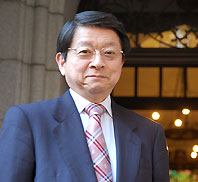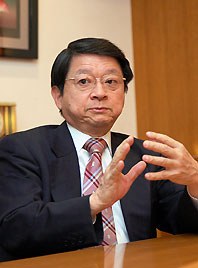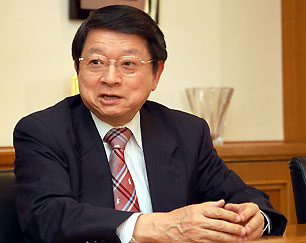Yoshihiro Katayama, Professor, Faculty of Law
Capitalizing on an abundance of administrative experience in the lifetime pursuit of a theory of citizen-centered local government
Yoshihiro Katayama

Born in Okayama Prefecture in 1951. Graduated from the University of Tokyo Faculty of Law in 1974. Entered the Ministry of Home Affairs in the same year. Amongst other roles, served as head of the National Tax Agency's Noshiro Tax Office, Secretary to the Minister of Home Affairs, head of the Tottori Prefecture General Affairs Department and head of the Ministry of Home Affair's Fixed Property Tax Division before assuming the governorship of Tottori Prefecture in 1999. Reelected to the Governor of Tottori Prefecture in 2003. Retired to assume a professor (Non-tenured) at Keio University Graduate School of Law after completing his term in 2003. Assumed current position in 2008. Served at the Minister of Internal Affairs and Communications between September 2010 and September 2011. Other notable positions include member of the Central Council for Education, Vice Chairman of the Local Government System Research Council and member of the Government Revitalization Unit.
Publications include Shimin-shakai to chiho-jichi ("Civil society and local government"), "Jichi" wo tsukuru ("Building self-government") and Nihon wo miru ("Examining Japan").
Incorporating government experience into lectures
─ After going from the Ministry of Home Affairs to two terms as Governor of Tottori Prefecture, what made you decide to purse the path of an academic?
I did it because I wanted to systematize the concrete, real-life experiences and insights I gained serving in the Ministry of Home Affairs and as a governor, and then apply this to actual government settings as well as to research into local government.
I was approached by Keio University right around the time when I was completing my second term as governor and was asked if I would head up a course on local governance theory. Since this is where my focus lies, I accepted.
In my lectures I do not simply explain systems and mechanisms of governance, I draw on the actual challenges that exist in local governance, social welfare, regional promotion and other areas to get students thinking about real life issues. I want to foster an interest in local government and politics and to use this as a medium through which to appreciate national government. In order to accomplish this, it is essential to encourage debate and critical thinking.
─ How do you use your class to get students thinking about local government?
Using practical examples gets the students' attention. The tax reduction issue that Nagoya City's Mayor Kawamura is grappling with is a terrific learning tool. I explain the background of the issue, examine how local government tax rates are determined, look at such factors as the relationship between legislatures and taxes, and use all of this as a launching pad for student discussion on the appropriateness of tax reductions. Another example is the "Osaka vision" promoted under Osaka City's Mayor Hashimoto. These examples are things I was involved with as Minister of Internal Affairs and Communications, and there is no shortage of such cases to draw on in teaching students. I believe that it is an important responsibility of education to utilize this sort of mental exercise to cultivate the informed citizens and voters who are the foundation of democracy.
My seminar involves lots of reading that gets students thinking about universal principles of government. For example, I recently had my students read Animal Farm by British author and journalist George Orwell, and we then compared and contrasted it with contemporary politics. Students today do not read as many books as we did when we were students; however, when we provide them with a motivation to do so, they develop an interest and begin to read more.
Surprise at the gap between theory and reality in local government

─ What made you interested in studying local government?
I majored in political science in university and took a seminar which studied local government. Research at the time was dominated by theories of local government as a tool for national governance; however, the professor of seminar class was well-versed in American self-governance, and the operating ideology of the seminar was "grass roots democracy," whereby each local citizen is a conscious participant in government, building democracy from the bottom up.
I did my fieldwork in local government document management under the professor. I studied how local governments disclose information to citizens, but as I went around to various local governments, I found the personnel to be wary of me; their attitude was, "What are you looking for?" I was surprised by the tremendous difference between the reality of local government and the idealized image of local government that I was taught in my political science courses at the university. It was apparent that local government personnel had no desire to share documents and information with the public. Information is not to be hoarded and monopolized, it is to be shared with citizens, because only then can they participate and have an impact on local government. I felt keenly that a mechanism for getting information out was needed.
This plus a desire to help build a truly grass roots, local government democracy in Japan led me into my life's work of involvement with local government.
─ Was this what motivated you to enter the then Ministry of Home Affairs following graduation from university?
Actually, I was a bit conflicted over whether to pursue the path of the academic or the path of the professional.
This was right around the time that reform governments were being elected in Tokyo, Kanagawa, Saitama and elsewhere, and these reform-focused local governments were moving to install actual citizen governments rather than entrust power to executive administrators. I also strongly desired to see citizen-focused popular sovereignty reflected in the operation of local government; so with the aim of playing a role in its development, I joined the Ministry of Home Affairs (which is now the Ministry of Internal Affairs and Communications).
After joining the Ministry of Home Affairs, I had numerous opportunities to observe local governance first-hand, but very rarely did I find a local government which, in practice, matched with the ideals that I held. Many a time I was struck by the need for more rational action on the part of publicly elected leaders and legislatures, whereby the individual citizens would serve as the central axis of democracy; and I often thought to myself how I would do things differently if I were in charge.
─ What sorts of things struck you after you became a governor?
Local government has two aspects to it: one is "organizational government," which involves increasing independence from the national government through decentralization, power transfers, etc., and "citizen government," which involves making it easier for citizens to ensure their will is reflected in local government. After I became governor I noted that, while some degree of progress has been made with regard to organizational government, there was still much to be done in terms of citizen government. Various challenges presented themselves daily, such as the need to expand opportunities for information disclosure and citizen participation in government and the need to reform social welfare and education policy from the perspective of the citizens. In response to these challenges and in order to ascertain and understand the wishes of citizens, we took such measures as establishing a "Citizens' Office" intended as a means of unifying the mechanisms for handling citizen consultations and complaints regarding taxes, social welfare, education, prefectural government and anything else citizens wanted to bring to our attention.
Also, because information disclosure lies at the core of local government and is the all-purpose medicine common to all reforms, we instituted reforms relating to information disclosure. For example, if someone wants to examine budgetary requests during the budget creation process, they can find it on the Internet.
This is one example of a concrete measure taken which addressed an issue that I have felt strongly about since a young age.
Creating local government that encourage proactive citizen participation

─ What do you feel is important in the establishment of democratic local government?
Without a change in the thinking of those people connected with central and local governments, real democratic local government cannot be achieved. Central government bureaucrats still have the central government-centric mindset that has existed since the Meiji era, and they are unable to break themselves free from a philosophy which views local governments as a part of the overall central government. Meanwhile, there are still those in local governments who believe that they have to obey every direction issued by the central government. What is needed is a course reversal in thinking: to change from seeing the national government as the voice that matters to building local governments where residents are key and their views are reflected in policy as much as possible.
─ As a scholar, what direction do you want to take your research in?
I would like to take the specific, practical examples, etc., which I have accumulated up to this point and systematize and theorize them; as an academic subject, "local government theory" is relatively new and still has much to explore. Of particular interest to me at the moment is the nature of local legislatures. Japanese local legislatures have a kind of ritualized nature to them which is somewhat unusual compared to legislatures in other countries. These peculiarities are common to local legislatures throughout Japan. For example, legislative results are decided before the legislative session starts. Despite the fact that legislative matters should be decided through discussion and debate, local Japanese legislatures use elaborate behind-the-scenes maneuvering, questions and answers asked in advance and other means to produce a result before the session begins. Thus the legislatures are throwing away the role which they were originally intended to fulfill. I want to capitalize on my experience to examine ways in which the functioning of local legislatures can be restored.
*This article appeared in "Kenkyu Saizensen" (Jan. 16, 2012) of Keio University Japanese Website.
